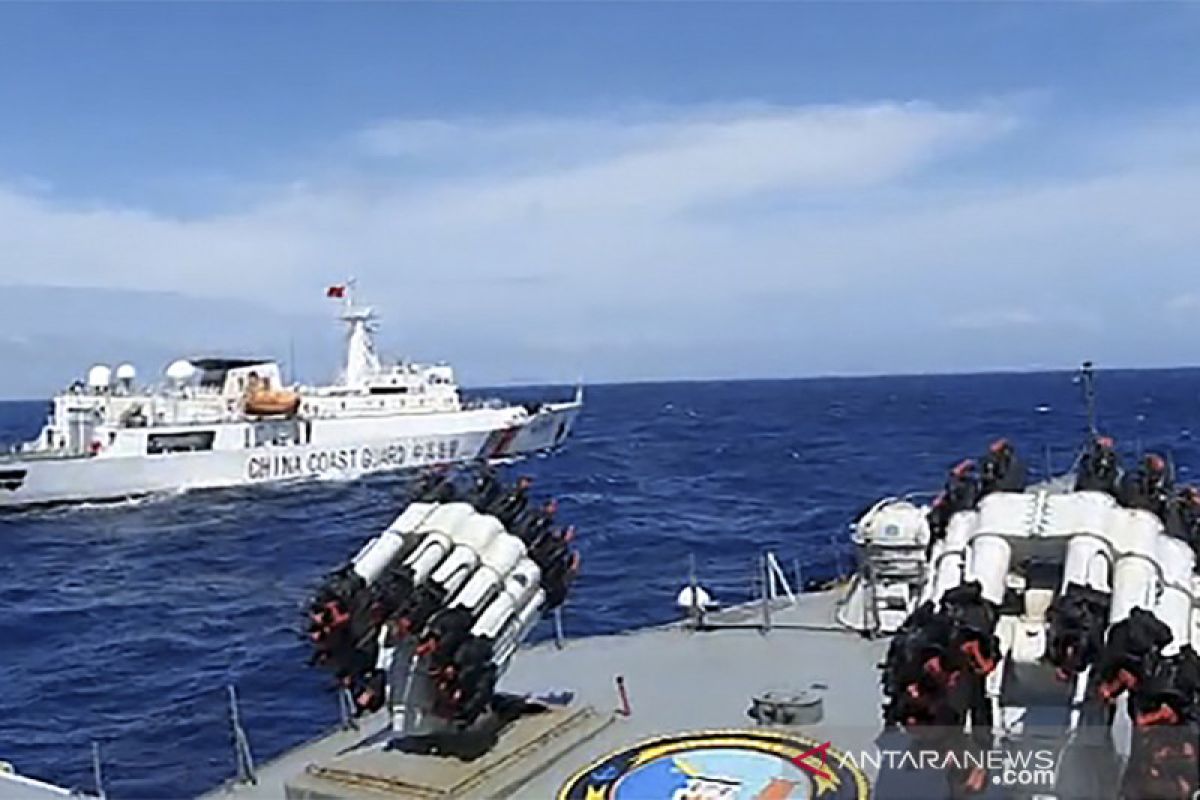Jakarta (ANTARA) - As one of the largest countries in Asia, Indonesia—without a doubt—must participate in resolving the disputes in the South China Sea (SCS).
Besides maintaining the maritime sovereignty of Indonesia, the disputes need to be resolved to prevent conflicts between Asian countries, which could cause regional and economic instability.
The territorial disputes in the SCS involve China, Malaysia, Brunei, the Philippines, Taiwan, and Vietnam. The disputes started to escalate after China released a map that it created based on its history. The map showed a nine-dash line around the SCS, which marked China's claims over the region.
China later released a new map with a ten-dash line that overlapped with Indonesia's Exclusive Economic Zone (EEZ) in the North Natuna Sea This led to Indonesia stepping in to strengthen its maritime sovereignty while defusing tensions.
Strengthening military forces has also become one of the government's priorities to anticipate SCS conflicts.
"The government is encouraging major project programs in an effort to strengthen the security of the Natuna Sea through sufficient defense equipment and increasing facilities and infrastructure of TNI (Indonesian military) integrated units," said Coordinating Minister for Political, Legal, and Security Affairs, Hadi Tjahjanto.
He made this statement during a discussion held by the Indonesia Strategic and Defense Studies (ISDS) research group in Jakarta in March.
The Indonesian Navy (TNI AL) can play a role in guarding maritime borders, while the Indonesian Air Force (TNI AU) can help carry out regional reconnaissance to safeguard border points.
The measures taken by the government to strengthen border security include pursuing mastery of defense equipment, improving human resource quality, and updating technology.
In addition to focusing on bolstering maritime defense, Indonesia is also participating in building peace through diplomacy.
The country is doing so through a non-military approach. In 2023, the Association of Southeast Asian Nations (ASEAN) and China agreed to conclude negotiations on the code of conduct (COC) in the SCS in three years.
This was an initiative by Indonesia to accelerate the COC negotiation in the disputed SCS.
Guidelines for the acceleration were previously adopted at a meeting of ASEAN foreign ministers and the director of the Office of China's Central Foreign Affairs Commission, Wang Yi, in Jakarta in 2023.
The guidelines included ASEAN and China's aspirations to complete the COC in three years or less through intensive discussions on pending issues.
The COC is expected to reflect international norms, principles, and rules that are in harmony and refer to international law in creating peace between the disputing countries.
"We all hope the COC can become an effective, substantive, and actionable document to avoid escalations and increase mutual trust and confidence between countries with interests in the South China Sea," Tjahjanto said.
Military observer and co-founder of the Institute for Security and Strategic Studies (ISESS), Khairul Fahmi, said that Indonesia can use other methods to cool tensions in the South China Sea, particularly military diplomacy.
The TNI is also well-positioned of spearheading military diplomacy in all countries involved in the disputes.
Some diplomatic efforts that could be made include holding joint training between countries, carrying out an exchange program for personnel to improve human resource quality, and building cooperation to maintain defense.
According to Fahmi, Indonesia has the capital to make those efforts because it is considered one of the countries with a great military power in Asia.
Indonesia could become a mediator between the disputing countries, he said.
Indonesia must also focus on protecting itself before making peace efforts between countries, including by protecting its maritime territory from the entry of foreign ships.
According to military observer Alman Helvas Ali, Indonesia must maintain a database of all ships in the region.
With that database, it would be easier for TNI AL to detect ships through their acoustic signatures.
Ali also underscored the importance of installing underwater listening devices in at-risk waters, namely narrow waters (choke points) in the Malacca Strait, Sunda Strait, Lombok Strait, Sulawesi Strait, and the North Natuna Sea.
Baca juga: Korut siap perkuat persahabatan dengan China
Baca juga: Pemerintah China sudah evakuasi 51 warganya dari Haiti
He expressed optimism that improving security technology would make Indonesia strong and respected in Asia.
Indonesia's path to cooling tensions would be smoother, as its voice would be heard more readily by other countries.
Latest Meetings with China
So far, Indonesia has continued to pursue diplomatic efforts.
On April 1–2, Indonesian Defense Minister Prabowo Subianto held meetings with several key officials in China. He also met with Chinese President Xi Jinping, Chinese Premier Li Qiang, and Chinese National Defense Minister Admiral Dong Jun.
It is believed that the meeting was held not only to discuss cooperation in the defense sector but also efforts to resolve disputes in the SCS.
Though Prabowo was welcomed by the Chinese leaders, Ali reminded the government to stay alert.
"We must remain vigilant because what China says in the world of diplomacy is often different from what they do at sea," he expounded.
He underscored that China will always claim the SCS region as its territory.
According to the observer, China has, in several instances, seemed to show a peaceful attitude and a wish to end the disputes. However, its attitude has been the opposite of what has been done in the SCS.
Citing an example, he recalled the recent encounter between vessels belonging to China and the Philippines on the SCS borders, which heightened tensions.
Therefore, increasing security by improving defense equipment is the right step in addition to making diplomatic efforts, he said.
Even though the dynamics of diplomacy often do not produce the outcome that Indonesia expects, approach after approach will continue to be taken to create regional peace.
The strengthening of the military is continuing in line with diplomatic efforts.
With Indonesia's consistent efforts to mediate with the disputing countries, the peace that Indonesia and all ASEAN countries are dreaming of can be realized in the SCS.
Indonesia's role in resolving South China Sea disputes

File - Indonesia's KRI Tjiptadi-381 stops a Chinese Coast Guard ship while patrolling in the North Natuna Sea, Riau Islands, on December 30, 2019. (ANTARA FOTO/HO/Dispen Koarmada I/pras)









